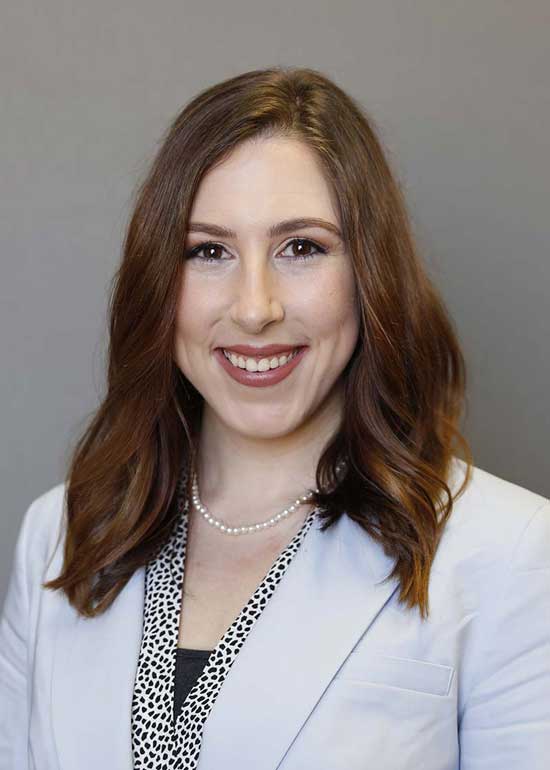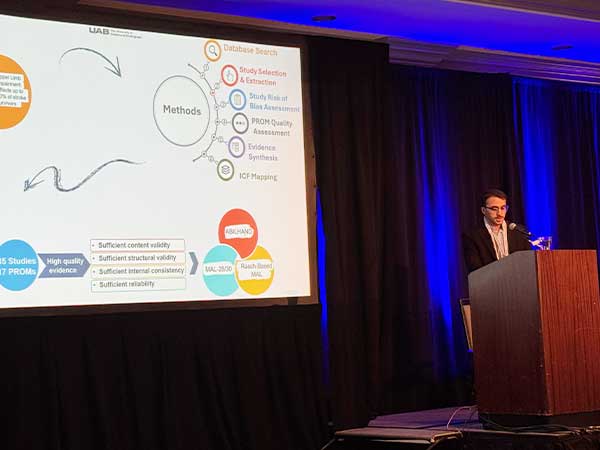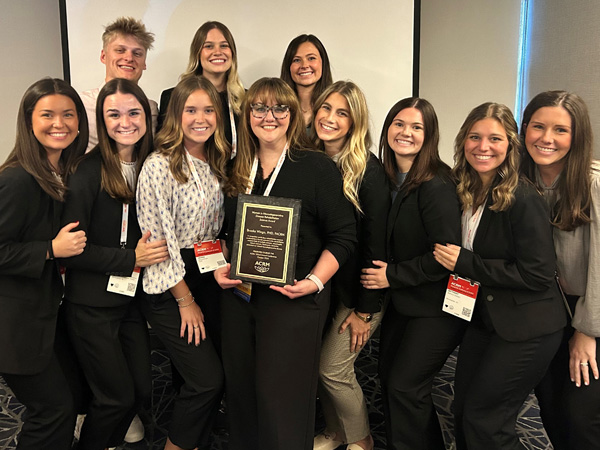 Christine Ferguson When a young Christine Ferguson stepped onto the campus of the University of Alabama as a wide-eyed freshman pre-med student, she had no idea that a personal interest in health would spark a flame that has now grown into a full-blown blaze of research.
Christine Ferguson When a young Christine Ferguson stepped onto the campus of the University of Alabama as a wide-eyed freshman pre-med student, she had no idea that a personal interest in health would spark a flame that has now grown into a full-blown blaze of research.
Now, just a few months since becoming the first doctoral graduate in the inaugural Alabama human nutrition Ph.D. program, Dr. Ferguson is putting the knowledge and skills as a researcher to practical use at the UAB/Lakeshore Research Collaborative.
Crimson and white through and through, Dr. Ferguson received her bachelor’s in food and nutrition before going on to earn her master’s and doctorate from Alabama, spending nearly a third of her life in school at Tuscaloosa.
Working at DCH Regional Medical Center in Tuscaloosa, Dr. Ferguson grew tired of seeing patients in her given context – not necessarily because of the interactions, but because of the way they were structured.
“I just felt like I would see people for a really short amount of time, then they would discharge and leave, and I would never see them again,” she recalled.
Her solution? Instead of pursuing a career as a dietitian, she pursued a master’s degree in human nutrition, which opened her eyes to potential careers in research.
Once again, as seems to be a constant theme in the field of research, a personal interest crossed paths with a professional aspiration, and Dr. Ferguson conducted her master’s thesis on the use of diet to treat Parkinson’s Disease.
As the University of Alabama was beginning to enroll its new Ph.D. program in human nutrition, the timing seemingly worked out perfectly as Dr. Ferguson finished her thesis to join the program’s inaugural cohort, aided by a strong mentorship with her soon-to-be doctoral advisor Dr. Amy Ellis.
Dr. Ellis first came across Dr. Ferguson as a junior in a lecture-size medical nutrition therapy class, in which she stood out among a class of 80 undergraduates.
“She stood out in that class as someone who had a heart for research, which is pretty rare for an undergraduate to have that vision and interest to come to office hours and talk about research and practical applications,” Dr. Ellis said.
Later, Dr. Ferguson was in another of Dr. Ellis’ classes when she gave a journal presentation on Parkinson’s Disease, which led to her thesis, and the rest is history.
The relationship between the two continued to blossom as Dr. Ellis became more and more intertwined with Dr. Ferguson’s academic journey. Dr. Ferguson embraced the feedback she got from that presentation and went on to work in the community to speak to support groups about nutrition, teach classes, earn a registered dietitian’s license, see patients in the hospital, work with the Michael J. Fox Foundation and put together a master’s thesis and doctoral dissertation on Parkinson’s.
Of course, despite the prolific academic success for Dr. Ferguson, her time at Alabama didn’t come without challenges.
“She was a great, great example to all of our other doctoral students and even our faculty because she planned a completely different dissertation project than she actually did,” Ellis said.
Months before it was time to wrap up her long academic journey, Dr. Ferguson’s dissertation fell through because of the COVID-19 pandemic. She had already done all the IRB and Institutional Safety Board paperwork, proposed her dissertation, defended it and started to train graduate assistants to help in the clinical trial.
So, she designed a whole new dissertation proposal and recruited people to her new Parkinson’s study despite all the complications due to the pandemic.
“The thing I always admired so much was I never heard her complain one time about having to re-do so much work,” Dr. Ellis said with a laugh of admiration.
Fresh off the conclusion of her Ph.D., Dr. Ferguson is eager to get to work and excited to see her experience as a student serve her well in the exact place she thinks she should be.
“What started the passion about what I’m doing, with my history as a dietitian, I really like research, but I like working with people, and I don’t want to be stuck working in a lab, I don’t want to be just stuck working analyzing data behind a computer all day,” Dr. Ferguson said.
And for Dr. Ferguson, it seems as though NCHPAD and the UAB/Lakeshore Research Collaborative offer the best of both worlds: research and its practical application.
At first, a personal interest led to studying nutrition with regards to Parkinson’s. Now, at the Collaborative, Dr. Ferguson sees endless possibilities for filling in the gaps of the fields.
“I’m so excited she’s over there,” Dr. Ellis said. “I think it’s going to be a win-win. She’s going to get the best experience possible. She’s going to go full throttle and give it everything she’s got.”
“It’s the perfect fit.”

